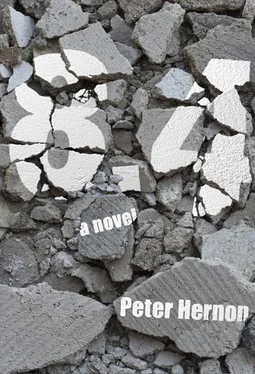In a couple of minutes the chopper would be putting down in Memphis. He wanted to meet with the USGS and university people there. He’d brought along his national science adviser. Steve Draper.
As Ross stepped out of the galley, he was confronted by his chief of security, Phil Belleau. Belleau had been with the Secret Service for twenty years. Ross liked to tell him he was the only man he’d ever met who didn’t have a neck, absolutely didn’t have one. The big head seemed to balance like a ball on his shoulders. He looked like an all-pro defensive back.
Belleau was angry. Ross knew why.
“Mister President, for the last time. We can’t guarantee your safety. We’ve got ten men with you and another fifteen already on the ground. It’s total chaos down there. Anybody could take a shot at you. There’s no police force to speak of. No security. You were a fool the way you walked into those crowds in St. Louis.”
Ross let him get it out of his system. He probably deserved it. And Belleau was about the only man he’d let talk to him that way.
“Better get used to it, Phil,” Ross said when the agent had finished venting. “I… have… got… to… be… seen. These people have got to know they’ve still got a federal government to turn to. It’s about all they do have right now.”
Belleau, an emotional, spontaneous man, took a deep breath and exhaled slowly. He had to make him understand. “Mister President, a lot of people are damned mad,” he said, softening his tone. “Out of their heads with anger. They’ve lost everything. Some have lost their families. A lot of them have lost homes, their businesses, jobs. Some of them are going to blame the government, blame you personally. Blame you for not giving them any warning. Blame you for not having enough emergency supplies ready or for not getting their homes rebuilt overnight. Blame you for whatever the fuck they can think of. Any one of them could try to kill you. So for the record, I’m asking you again to meet with the people you’ve got to meet with in Memphis. Do it in private, not out in the open. Then get the hell out. Memphis isn’t a city anymore.”
“I read you loud and clear, Phil,” Ross said. He put a hand on the agent’s shoulder. “Just do your best. And hell, you know anybody wants to shoot me, they ought to go for my ass. It’s a bigger target.”
Belleau grinned in spite of himself. “We better get belted in,” he said, glancing at his watch. “We’ll be landing in less than a minute.”
The Sikorsky circled the University of Memphis campus, banking so the president could get a look at the damage. Hundreds of people were on the ground, digging through the rubble. He saw the rows of dead bodies lined up along a sidewalk and closed his eyes. It was St. Louis all over again.
Rage hammered at him, a blind rage directed against a natural force that he hated with every ounce of his being. He knew it was a foolish, draining expenditure of emotion, but couldn’t help himself. He needed to direct his anger at something, his sense of hopelessness.
Then, suddenly, they were on the ground. Ross zipped up the brown leather bomber jacket that bore the presidential seal and stepped into the cold air.
MEMPHIS
JANUARY 15
7:08 A.M.
JOHN ATKINS AND ELIZABETH HOLLERAN WATCHED the big helicopter slowly touch down, nose up, on the lawn of the earthquake center. Every geologist there had gathered along with a contingent of Memphis officials, including the mayor, a short, middle-aged man in a mud-splattered overcoat, who looked completely devastated. A squad of National Guard soldiers and Secret Service agents had fanned out around the perimeter of the landing zone.
It was the first time Atkins had seen the president in person. He was a bigger man than he’d expected and looked deadly serious as he stepped off the helicopter.
He recognized the president’s national science adviser, Steve Draper. He knew Draper, a physicist, by reputation—a solid researcher, who’d written one of the definitive college texts on physics. He’d hosted a well-received PBS documentary on recent scientific breakthroughs.
Draper broke away from the presidential entourage and approached Atkins and Elizabeth Holleran. He had longish sandy hair and looked younger than his age. He was nearly sixty and wore a thick parka with a hood.
“Are you John Atkins?” he asked.
Atkins nodded and introduced Holleran.
“Bob Holly at USGS said I should look you up when I got here,” Draper said. Holly was Atkins’ boss, one of the agency’s top men.
Draper asked Atkins whether they could talk privately for a few moments. He led him to the side of the library annex. He looked and sounded impatient.
“Just how bad is it?”
Atkins had anticipated the question as soon as he saw Draper start to head in his direction. He’d thought about how he should answer. In a matter-of-fact voice that surprised him, he heard himself say, “We could be heading for another big quake.”
Draper looked at him hard. “You’re willing to say that for the record?”
Atkins nodded. “At the very least, we’ve got to consider it as a possibility and run some scenarios.” He quickly briefed Draper on the new fault that had appeared in western Tennessee and Kentucky and the unusually strong aftershocks they were experiencing. “The way these new faults have opened up worries the hell out of me,” he said. “There’s got to be a lot of energy piled up down there.”
“Good Lord,” Draper said slowly, trying to comprehend what he’d just been told. It was much worse than he’d imagined. “Would you tell that to the president?”
“Yes,” Atkins said, knowing what he was doing, what he was risking.
Draper, understanding, squeezed Atkins by both shoulders. Then he walked off quickly, clutching a battered leather briefcase as he hurried after Nathan Ross.
Atkins explained to Holleran what had happened.
“I’ll support you,” she said. She’d guessed what they’d been talking about and had noticed at one point in the brief conversation how Draper’s face had suddenly tightened. She knew what had happened: he’d just been told what they were up against.
“Thanks, but no sense both of us sticking our necks out,” Atkins said, smiling gratefully. “Let’s just see how it goes.”
They joined the other scientists in the annex library. There were no preliminaries. Everyone was seated around tables that had been shoved together to form a U. The president sat near the front. Someone had given him a paper cup with steaming coffee.
Atkins got his first up-close look at Nathan Ross. The man’s eyes were red, dark-rimmed, the cheeks sallow. He was slumped back, holding the cup with both hands. He appeared utterly exhausted.
Paul Weston summarized what they knew—and what they didn’t. “We still need to gather a lot more data,” he said, concluding his brief presentation.
The president, who’d listened quietly, asked a single question. “Do you think we’re going to have another major earthquake down here any time soon?”
Taken aback by the president’s bluntness, Weston stammered, “That’s hard to say, Mister President. “We’re only starting to get—”
Ross impatiently raised a hand to cut him off. “I want your personal opinion, doctor. Your best guess as an expert. What do you think’s going to happen on the New Madrid Seismic Zone?”
Weston tried to hedge, but again Ross pressed him hard for his opinion. He was insistent and totally focused. Cornered, Weston finally said, “Mister President, I’m sorry. I can’t answer that. I don’t want to guess or speculate on something like this. I want to deal with facts, and we just don’t have enough of them to answer your question.”
Читать дальше












